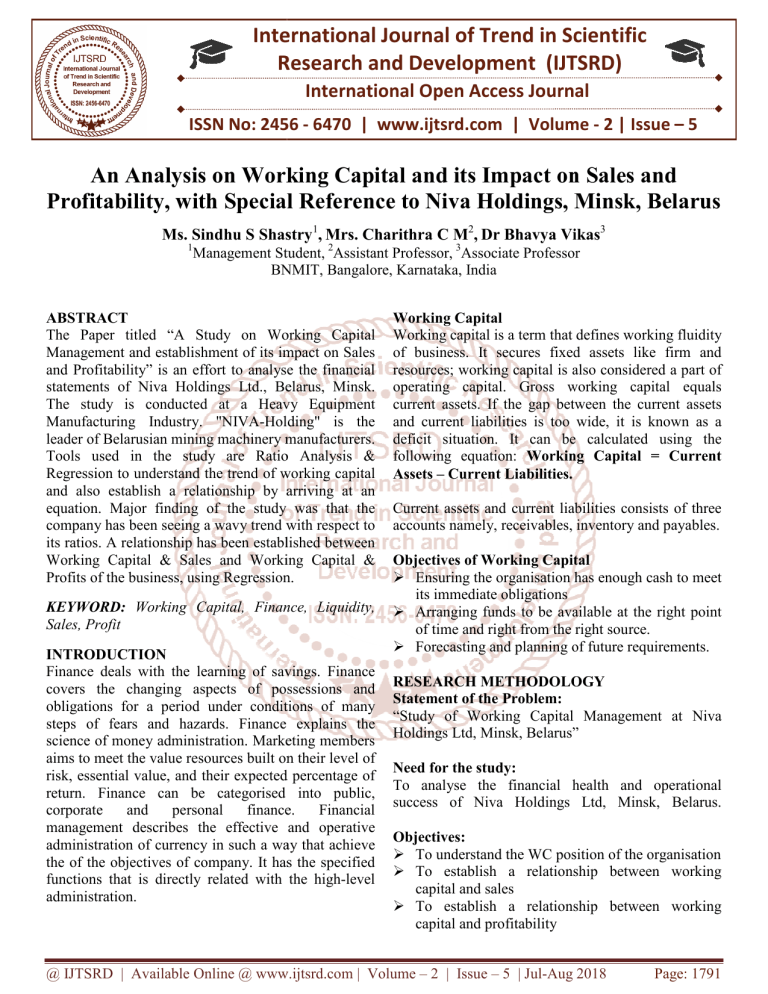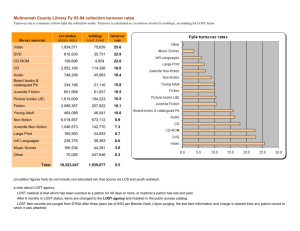
International Journal of Trend in Scientific
Research and Development (IJTSRD)
International Open Access Journal
ISSN No: 2456 - 6470 | www.ijtsrd.com | Volume - 2 | Issue – 5
An Analysis on
n Working Capital and its Impact on
n Sales and
Profitability,, with Special Reference tto
o Niva Holdings, Minsk, Belarus
Ms. Sindhu S Shastry1, Mrs. Charithra C M2, Dr Bhavya Vikas3
1
Management Student
Student, 2Assistant Professor, 3Associate Professor
BNMIT, Bangalore, Karnataka
Karnataka, India
ABSTRACT
The Paper titled “A Study on Working Capital
Management and establishment of its impact on Sales
and Profitability” is an effort to analyse the financial
statements of Niva Holdings Ltd., Belarus, Minsk.
The study is conducted at a Heavy Equipment
Manufacturing Industry. "NIVA-Holding"
Holding" is the
leader of Belarusian mining machinery manufacturers.
Tools used in the study are Ratio Analysis &
Regression to understand the trend of working capital
and also establish a relationship by arriving at an
equation. Major finding of the study was that the
company has been seeing a wavy trend with respect to
its ratios. A relationship hass been established between
Working Capital & Sales and Working Capital &
Profits of the business, using Regression.
KEYWORD: Working Capital, Finance, Liquidity,
Sales, Profit
INTRODUCTION
Finance deals with the learning of savings. Finance
covers the changing aspects of possessions and
obligations for a period under conditions of many
steps of fears and hazards. Finance explains the
science of money administration. Marketing members
aims to meet the value resources built on their level of
risk, essential
al value, and their expected percentage of
return. Finance can be categorised into public,
corporate
and
personal
finance.
Financial
management describes the effective and operative
administration of currency in such a way that achieve
the of the objectivess of company. It has the specified
functions that is directly related with the high
high-level
administration.
Working Capital
Working capital is a term that defines working fluidity
of business. It secures fixed assets like firm and
resources; working capitall is also considered a part of
operating capital. Gross working capital equals
current assets. If the gap between the current assets
and current liabilities is too wide, it is known as a
deficit situation. It can be calculated using the
following equation: Working Capital = Current
Assets – Current Liabilities.
Current assets and current liabilities consists of three
accounts namely, receivables, inventory and payables.
Objectives of Working Capital
Ensuring the organisation has enough cash to meet
its immediate obligations
Arranging funds to be available at the right point
of time and right from the right source.
Forecasting and planning of future requirements.
RESEARCH METHODOLOGY
Statement of the Problem:
“Study of Working Capital Management at Niva
Holdings Ltd, Minsk, Belarus”
Need for the study:
To analyse the financial health and operational
success of Niva Holdings Ltd, Minsk, Belarus.
Objectives:
To understand the WC position of the organisation
To establish a relationship between working
capital and sales
To establish a relationship between working
capital and profitability
@ IJTSRD | Available Online @ www.ijtsrd.com | Volume – 2 | Issue – 5 | Jul-Aug
Aug 2018
Page: 1791
International Journal of Trend in Scientific Research and Development (IJTSRD) ISSN: 2456-6470
Scope of the study:
The scope of the study is limited to Niva Holdings,
Minsk, Belarus.
Research Methodology
Data Source: Secondary Data
Data is collected from articles on Working Capital
Management.
Data is also collected from the employees working
in Niva Holding and from their financial
statements.
Interpretation
Net working capital measures the business’s
possible reserve of funds.
Niva Holdings has a higher NWC which indicates
that the company has a greater potential to meet
its current obligations
Networking Capital Ratio
Graph Showing Net working capital ratio
Data Period:
Financial Year 2014-2015, 2015-2016 and 20162017.
Data Analysis:
Quantitative research hence, there is negligible use of
primary data. Analysis of the data is done using ratios
and regression.
Limitations
No past data available on study of Working
Capital Management in the Republic of Belarus.
Access to many financial data was restricted.
Literature Review
Fluidity and efficiency of position for the business is
not reasonable and desirable to be supported in
direction to be able to encounter its responsibilities in
time were observed in studies made Madhavi K.
(2014) and Joseph (2014) in their papers. Similar
observations we made by Durga (2015) that the
performance of sales has remained good over the
years however, the annual growth rate has seen a
downward trend when a relation between working
capital and sales and profit was established.
Interpretation
A company having a higher NWC ratio has a
greater ability to meet its current obligations.
The Net Working Capital of the Company has
seen a wavy trend in the last 3 financial years.
Current Ratio
Graph Showing Current Ratio
ANALYSIS AND INTERPRETATION
Net working capital
Graph Showing Net working capital
Interpretation
The above graph depicts that the current ratio of
Niva holdings for the last three financial years.
The ideal ratio is 2:1, in all the years except the
year 2015 the ratio is more than 2:1 and we can
depict that the liquidity position of Niva Holdings
is favourable.
Quick Ratio
@ IJTSRD | Available Online @ www.ijtsrd.com | Volume – 2 | Issue – 5 | Jul-Aug 2018
Page: 1792
International Journal of Trend in Scientific Research and Development (IJTSRD) ISSN: 2456-6470
Graph Showing Quick Ratio
Interpretation
From the above graph it is noted that debtors have
been paying the company on time in the years
2015 and 2016. It has however seen a lag in 2017.
Creditors Turnover Ratio
Graph 4.7 – Showing Creditors Turnover Ratio
Interpretation:
The Ideal ratio is 1:1 which indicates that the firm
is able to quickly meet its obligations.
From the above graph it can be interpreted that
over the year Niva Holdings has done
exceptionally well.
Inventory turnover ratio
Graph Showing Inventory Turnover Ratio
Interpretation
From the above graph it can be noted that the
creditors are been paid on time and the company
has a good credit worthiness.
It can also be interpreted that the company is not
making use of given credit facility.
Working Capital Turnover Ratio
Graph4.8 – Showing Working Capital Turnover
Ratio
Interpretation:
From the above graph it can be noted that the firm
has been efficient with respect to converting its
inventory into sales.
In the year 2015 and 2016 however it has seen a
drastic fall in 2017 which shows no efficiency.
Debtors Turnover Ratio
Graph Showing Debtors Turnover Ratio
Interpretation
The above graph depicts that the Niva Holdings
has maintained a good working capital turnover
ratio meaning that it has sufficient funds to run the
operations of the business for the year 2015 and
2016.
However, its position seems dangerous in 2017.
Working Capital to Net Worth Ratio
@ IJTSRD | Available Online @ www.ijtsrd.com | Volume – 2 | Issue – 5 | Jul-Aug 2018
Page: 1793
International Journal of Trend in Scientific Research and Development (IJTSRD) ISSN: 2456-6470
Graph 4.9 – Showing Working Capital to Net
worth Ratio
Interpretation
The relationship with the shareholders seems
healthy in the year 2015 and 2016.
In the year 2017 the relationship doesn’t seem as
smooth.
1. Working Capital & Sales Regression Analysis
Sales
Working Capital
Product of Sales and Working
(x)
(y)
Capital (x*y)
Square of sales
(x2)
Sl. No
Year
1
2015
281103
161189
45310711467
79018896609
2
2016
203648
128685
26206442880
41472507904
3
2017
11959
174336
2084884224
143017681
Gross Total
3
496710
464210
73602038571
120634422200
Denotation
N
Σx
Σy
Σxy
Σx2
Formula = Σy = na + bΣx
Formula = Σxy = aΣx + bΣx2
By replacing the formula with values
By replacing the formula with values
464210 = 3a + 496710b
7360203851 = 496710a + 120634422200b
Multiply by 496710
Multiply by 3
230577749100 = 1490130a + 246720824100b 22080611553 =1490130a + 361903266600b
--- Eq 1
--- Eq 2
Subtract Eq 2 from Eq 1 we get:
208497137500 = 0 – 115182442500b
b = 208497137500 / 115182442500 = 1.8101
Now, replacing b = 1.8101 in Eq 1
i.e. 464210 = 3a + 496710 (1.8101)
464210 = 3a + 899094.771
-3a = 434884.771
a = -144961.59
Working Capital (y) = -144961.59 + 1.8101 Sales (x)
The above equations can be used to forecast working capital (dependent variable) by use of sales
(independent variable)
@ IJTSRD | Available Online @ www.ijtsrd.com | Volume – 2 | Issue – 5 | Jul-Aug 2018
Page: 1794
International Journal of Trend in Scientific Research and Development (IJTSRD) ISSN: 2456-6470
Sl. No
Year
1
2015
2. Working Capital & Profit Regression Analysis
Profit Working Capital Product of Profit and Working
(x)
(y)
Capital (x*y)
23167
161189
3734265563
2
2016
-42783
128685
-5505530355
1830385089
3
2017
420
174336
73221120
176400
Gross Total
3
-19196
464210
-1698043672
2367271378
Denotation
N
Σx
Σy
Σxy
Σx2
Square of Profits
(x2)
536709889
Formula = Σy = na + bΣx
Formula = Σxy = aΣx + bΣx2
By replacing the formula with values
By replacing the formula with values
464210 = 3a - 19196b
(1698043672) = (19196) a + 2367271378b
Multiply by (19196)
Multiply by 3
(8910975160) = (57588) a + 368486416b
5094131016 = 57588a + 710181411b
Subtract Eq 1 from Eq 2 we get:
140051061800 = 0 + 673332770b
b = 140051061800 / 673332770; b = 207.99
Now, replacing b = 207.99 in Eq 1
i.e. 464210 = 3a – 19196(207.99)
464210 = 3a – 3992576.04
-3a = 3528366.04
a = -1176122.013
Working Capital (y) = -1176122.013 + 207.99 Profit (x)
The above equation can be used to forecast working capital (dependent variable) by use of profit
(independent variable).
Findings
Niva Holdings has a higher NWC which indicates
that the company has a greater potential to meet
its current obligations as seen from the
calculations.
The liquidity position of Niva Holdings is
favourable as their liquid ratio.
The relationship with the shareholders seems
healthy as they are paying off their shareholders
on time.
The company is not making use of given credit
facility as they have been consistent in paying off
their creditors on time.
A relationship has been established between
Working capital and Sales using he following
equation: Working Capital (y) = -144961.59 +
1.8101 Sales (x).
A relationship has been established between
Working capital and Profit using he following
equation: Working Capital (y) = -1176122.013 +
207.99 Profit (x).
Suggestions
The company can consider making optimal use of
the credit facility available as they have been
paying their creditors on time.
The company can also increase the Debtors for
contingency in case there are any financial
emergency in the future.
Avoiding of high liquidity in the operations is
recommended as there might me high cash
outflows and liquidity does not earn any return to
the firm.
Conclusion:
The study has been helpful to understand the Working
Capital Management. The organisation has seen an
inconsistent trend with respect to its working capital
management. The trends wobble between the
extremes of financial stability. Major finding of the
study was that the company has been seeing a wavy
trend with respect to its ratios. The study has also
revolved around establishing a relationship between
@ IJTSRD | Available Online @ www.ijtsrd.com | Volume – 2 | Issue – 5 | Jul-Aug 2018
Page: 1795
International Journal of Trend in Scientific Research and Development (IJTSRD) ISSN: 2456-6470
Working Capital & Sales also Working Capital &
Profit of the organisation.
Liquidity: An Empirical Study of Ashok Leyland
Ltd., International Journal of Research in
Commerce and Management, Vol. 5, No. 2, pp.
32-38
BIBLIOGRAPHY
Reference Articles:
1. Dr.T.Durga Prasad (2015),Working Capital
Management with Regression Analysis (With
reference to Visakhapatnam Steel Plant (RINL),
VSP) , Volume 3, Issue 8, ISSN 2349-4476
3. Madhavi
K.,
(2014),
Working
Capital
Management of Paper Mills, International Journal
of Research in Business Management, Vol. 2, No.
3, pp. 63-71
2. Jisha Joseph, (2014), Impact of Working Capital
Management on Firm‟s Profitability and
Webliography:
en.niva.by
@ IJTSRD | Available Online @ www.ijtsrd.com | Volume – 2 | Issue – 5 | Jul-Aug 2018
Page: 1796


